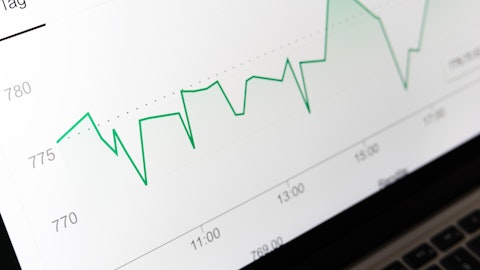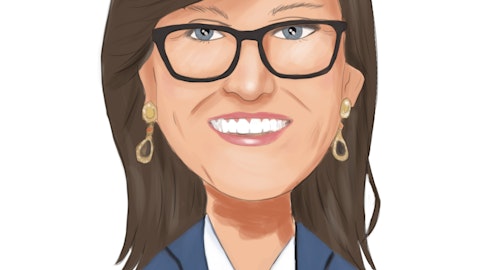Chad Beynon: Good morning. Thanks for taking my question. With respect to the gross margin guidance improvement for 2024, should we think about the 250 basis point to 450 basis point improvement, more of just kind of a factor of the scale and the growth that you’re going to have? Or are some of the, I guess, variable fees coming down and we should expect for that to continue just given some of your partnerships and what you’re able to do with payment processing and the like. Thanks.
Jason Robins: Yes. I mean I think it’s a number of different things that come with scale. Certainly, their discounts that come with volume and scale and things like payment processing. Also, promotional mix continues to trend down as we increase the ratio of existing to new customers. And — those things, I think, are the largest drivers.
Jason Park: Yes, I agree. I think it’s all of the above, Chad, where the improving promotional reinvestment rate due to our mix of existing versus new customers, our improving hold rate and then just ongoing optimization of our COGS vendors are all driving that improvement in gross margin rate.
Chad Beynon: Okay. Great. Thanks. And then we’ll probably see the public release, at least from New York, I believe, later today. With respect to the Super Bowl outcome and kind of the hold rates there, but could you maybe give us a little preview in terms of how that fit into the Q1 guidance? How you guys did in the Super Bowl from a hold standpoint?
Jason Robins: Yes. So I think this speaks to the power of our work that we’ve done over the last few years to build out the same game parlay product and improve player props and really diversify the bets that despite the fact that the game outcome did not go our way at all with the cheese winning, we ended up actually holding right in line with what we thought we would from a hold rate perspective. So that was really, I think, a testament to the great work the team has done over the last few years to drive more diversified bets and more parlays.
Chad Beynon: Impressive. Thank you very much. Appreciate it.
Operator: Thank you. Our next question comes from Barry Jonas with Truist Securities. Your line is open.
Barry Jonas: Thanks. Can you talk about whole trends in iGaming? Do you think there’s maybe a path to hire structural hold over time there?
Jason Robins: Yes. I think iGaming is a little bit different because it’s so high frequency. It’s really — whole rate matters, of course, if you look at the math. But if you think about kind of a customer and how they behave. Most people sit and they play for some period of time, and they have a budget and I think that hold rate generally doesn’t move more than 100 bps or 200 bps up or down in any given day, it’s much more stable than sports hold rate because it’s not outcome dependent at all. So it’s always something to look at, but I think it’s just a fundamentally different product. And it’s same thing with like live betting and game. If somebody is betting on every play of a game, taking a super high margin doesn’t necessarily make that person stick for as long as he can.
So it’s very different than, I think, somebody who’s making one or two bets pregame or maybe they’re making a lot of bets pregame, but they’re getting sort of on a much longer cycle and the money isn’t churning as quickly.
Barry Jonas: That makes sense. Then just a follow-up on Jackpocket. I guess, I’m trying to understand the risks to Jackpocket and the broader courier model. How do you see the potential for more states to legalize iLottery over time, which would effectively remove the need for service fees.
Jason Robins: Well, I think that the real question is, what can Jackpocket contribute to the overall lottery ecosystem. And regardless of how it evolves, I think their products, their customers are going to have a role to play. And this is something that any lottery would want, right? I mean it would certainly make any — I would think — I shouldn’t say any. I’m sure there’s some around the country that, for whatever reason don’t, but it increases the lottery market and increases sales. So it should be a no-brainer, I would think, for the vast majority of state lotteries. And I think Jackpocket is very well positioned for however it evolves in iLottery and other things. I mean they have an incredible customer base, a brand.
This is, I think, something that actually could be a real tailwind for them depending on how it evolves. But whether it continues to be the current model or whether it changes, I think that Jackpocket is extremely well positioned and is a very unique asset.
Chad Beynon: Thanks so much.
Jason Robins: Yes. One other thing worth noting too is, iLottery requires legislative action unlike what Jackpocket does. So I think while it could happen, it’s going to be a much slower burn. And I think the ability to get the digital lottery products that Jackpocket offers up and running in a number of states quickly is just much more seamless.
Operator: Thank you. Our next question comes from Jordan Bender with Citizens JMP. Your line is open.
Jordan Bender: Great. Thanks for taking my question. So the Barstool partnership kind of highlights it seen a past years of using your marketing budget and your ad spend. Can you maybe help us think about some of the higher cost legacy partnerships that are going to roll off this year versus some of the opportunity for incremental marketing agreements like a Barstool maybe into 2024 and into 2025. And the positive ROI you might see off of those? Thank you.





